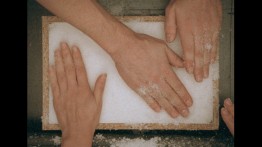The Crude and the Rare Catalog Available
POSTED ON: October 26, 2011

Lonnie van Brummelen & Siebren de Haan, "Monument of Sugar", 2007
The Crude and the Rare catalog is finished!
Contact the School of Art office to purchase a copy.
For the exhibition The Crude and the Rare, the School of Art invited 19 artists and collaboratives to contribute projects that consider the raw materiality of precious substances and the consequences associated with their extraction, as well as the physical and symbolic aspects of matter. With a diverse group of artists that span multiple generations and geographic areas, The Crude and the Rare investigates the political economy of several precious substances that are natural and synthetic ranging from gold, diamonds, oil, plastic, tar, quartz, and other natural resources.
With contributions and texts by Marina Abramović, Terry Adkins & Blanche Bruce, Bik Van der Pol, Ursula Biemann, Lonnie van Brummelen & Siebren de Haan, Mark Dion, Eva Diaz, Jimmie Durham, Grady Gerbracht, Alfredo Jaar, Sara Jordenö, Robert Kinmont, Jeff Lovett, Lize Mogel, Margaret Morton, Matt Mullican, Sophie Ristelhueber, Austin Shull, Lawrence Weiner, and Gilberto Zorio.
Catalogs are $25 ($17 for students).
Email: artschool@cooper.edu
Phone: 212.353.4200




